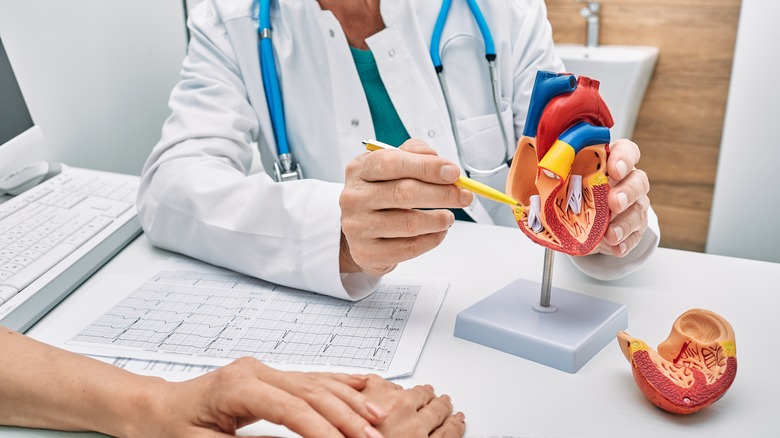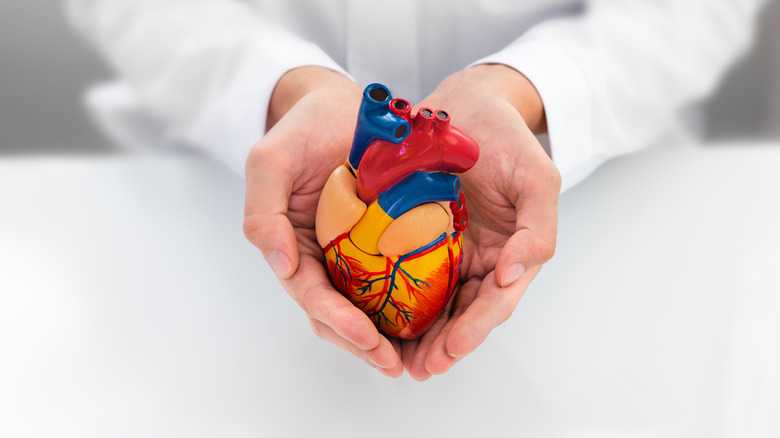Which Types Of Cardiomyopathies Can Be Inherited?
Cardiomyopathy is any disease that affects the heart muscle, making the heart lose its ability to pump blood effectively (via Johns Hopkins Medicine). Often, this condition causes the heart to thicken, stiffen, thin out, or become filled with foreign and harmful substances. However, there are various types of cardiomyopathy, each coming with various symptoms that include breathing difficulties, leg swelling, dizziness, rapid heartbeats, and fatigue (via Mayo Clinic).
Cardiomyopathies can affect people of all ages, as per the Centers for Disease Control and Prevention (CDC). In fact, about 1 in 500 adults have the condition (via the Cleveland Clinic). It can stem from various factors, however, genetics make some people more susceptible to certain types of cardiomyopathies, according to Healthline. Furthermore, the symptoms and warning signs of the heart condition can vary and worsen over time without treatment, per Mayo Clinic. Nevertheless, here are the types of cardiomyopathies that can be inherited.
Hypertrophic cardiomyopathy
Hypertrophic cardiomyopathy is very common, affecting about 1 million people in the United States and more than 36 million worldwide (via the Hypertrophic Cardiomyopathy Association). It often goes undiagnosed because many people with the condition rarely experience symptoms, according to Mayo Clinic. However, in those that do, common symptoms include shortness of breath, chest pain, or changes in the heart's electrical system, making the condition life-threatening.
Diagnosis often starts with an assessment of your medical history and a physical examination of your symptoms (via WebMD). You might also be advised to take further tests, including an echocardiogram, chest X-ray, exercise stress test, and a CT or MRI scan. In these cases, doctors usually look out for an abnormally-thick left ventricular wall larger than 15mm in order to confirm that you have hypertrophic cardiomyopathy (via the American College of Cardiology).
After diagnosis, treatment options are usually based on various factors, including your age, symptoms, and whether they have arrhythmias, per the Cleveland Clinic. These treatment options may include medications, like beta blockers and calcium channel blockers, to relax the heart muscle, lifestyle changes, and surgical procedures. Another treatment option includes the use of an implantable cardioverter defibrillator, where a device is placed under the skin. This can help reduce the risk of typical complications, like heart failure and sudden cardiac death. Other treatment options include septal myectomy, ethanol ablation, and heart failure management.
Dilated cardiomyopathy
Dilated cardiomyopathy is common in adults younger than 50, according to the American Heart Association. The condition often starts in the left ventricle, stretching and thinning the heart. Eventually, it spreads to the right ventricle and atria, dilating the heart's chambers and preventing it from contracting. Dilated cardiomyopathy can lead to various symptoms, including breathing difficulties, fatigue, and swelling of the ankles, feet, legs, and abdomen (via Mayo Clinic). Many people don't even experience symptoms in the early stages until the damage to the heart muscle worsens.
Beyond genetics, several other causative factors of dilated cardiomyopathy exist. While the condition can arise due to underlying conditions, like diabetes or congenital heart disease, it can also result from complications in the late stages of pregnancy or shortly after childbirth, per the Cleveland Clinic.
A diagnosis is usually made after a physical examination, assessment of your symptoms, and family history, explains WebMD. Your doctor may also recommend an echocardiogram, exercise stress test, CT, or MRI scan. In some rare instances, you may need a heart biopsy, which involves a microscopic examination of tissue samples from your heart.
Some types of dilated cardiomyopathy are reversible, and symptoms are treatable, while other types can't be treated, explains Johns Hopkins Medicine. Your doctor might make recommendations based on the severity of your case. Generally speaking, the treatment options include diuretics, anticoagulants, and medication, such as beta-blockers and ACE inhibitors.
Arrhythmogenic right ventricular dysplasia
About 30,000 to 200,000 people in the United States have arrhythmogenic right ventricular dysplasia, according to Cleveland Clinic. A 2022 article by StatPearls defines arrhythmogenic right ventricular dysplasia (ARVD) as a genetic disorder of your myocardium due to fatty infiltration of the right ventricular free wall. Akin to other cardiomyopathy types, this condition can be dangerous, resulting in the sudden death of young people and athletes. The condition is caused by certain abnormalities in the desmosomes, the structures that connect heart muscles together, adds Stanford Medicine. Keep in mind, several other genetic defects in the lower heart chambers can also trigger these abnormalities, which can lead to various symptoms, such as arrhythmia (via Johns Hopkins Medicine). Arrhythmia is characterized by racing heartbeats and palpitations of a fluttering sensation in the heart.
During a diagnosis, doctors usually look for an abnormally functioning right ventricle, arrhythmias, fatty myocardium, and a family history of ARVD (via the Cleveland Clinic). The use of antiarrhythmic drugs is the initial and most common form of treatment after a diagnosis is confirmed. However, you may be prescribed radiofrequency ablation if your doctor suspects you to be intolerant to these drugs, according to a 2008 article by the E-Journal of the ESC Council for Cardiology Practice. Other treatment options, like cardiac failure treatment and implantable cardioverter-defibrillator therapy, might also be recommended, depending on the patient's risk of sudden death due to ARVD.
Restrictive cardiomyopathy
Restrictive cardiomyopathy occurs from weak pumping and abnormal heart filling, affecting how it should function (per Medline Plus). Unlike other cardiomyopathy types, the heart muscle, in most restrictive cases, maintains its normal size and pumps normally until the disease progresses. Even though the heart pumps normally for some people with restrictive cardiomyopathy, there may be a problem in how the heart relaxes between multiple heartbeats. This abnormal heart function can affect the lungs, liver, and either or both of the lower heart chambers (via Penn Medicine).
Restrictive cardiomyopathy is the rarest type, and many people don't experience symptoms until the condition worsens, according to the Cleveland Clinic. For those who experience symptoms, common problems include chest pains, unexplained weight gain, dizziness, heart palpitations, and edema in the feet and legs. Diagnosis usually begins with identifying and addressing any underlying condition, per a 2017 review published in the journal Circulation Research. As for treatment, your doctor might prescribe diuretics, beta-blockers, or calcium channel blockers, notes the Cleveland Clinic.
Transthyretin amyloid cardiomyopathy
Transthyretin amyloid cardiomyopathy (ATTR-CM) is an uncommon but serious cause of restrictive cardiomyopathy, as per a 2022 article published in StatPearls. This condition occurs when transthyretin fibrils accumulate in the heart muscles, leading to new or worsening heart failure or other health risks. ATTR-CM often begins with minimal clinical signs and symptoms. As it progresses, it can lead to cardiac arrhythmia, heart failure, and conduction disease.
ATTR-CM comes in two types: familial (hereditary) and wild-type ATTR-CM, according to the Cleveland Clinic. The former is caused by an inherited change (mutation), whilst the latter has no known cause. Symptoms vary depending on the type. The wild type often presents no symptoms. For the familial type, symptoms usually appear in those over 50 years old. Keep in mind, the general symptoms of transthyretin amyloid cardiomyopathy include shortness of breath, bloated stomach, coughing or wheezing, and fatigue.
Unfortunately, transthyretin amyloid cardiomyopathy may be hard to diagnose. A 2021 study published in JAMA Cardiology notes that standard heart testing is not likely going to determine the condition. Rather, a comprehensive history and physical examination, which involves a doctor assessing the patient's family history of heart disease, might lead to better diagnostic results. In fact, doctors may recommend other specialized testing procedures, such as heart biopsies or blood and saliva tests. According to a 2022 study published in Frontiers in Cardiovascular Medicine, treatment options may include diuretic therapy and anticoagulation for patients likely to suffer heart failure or stroke.






